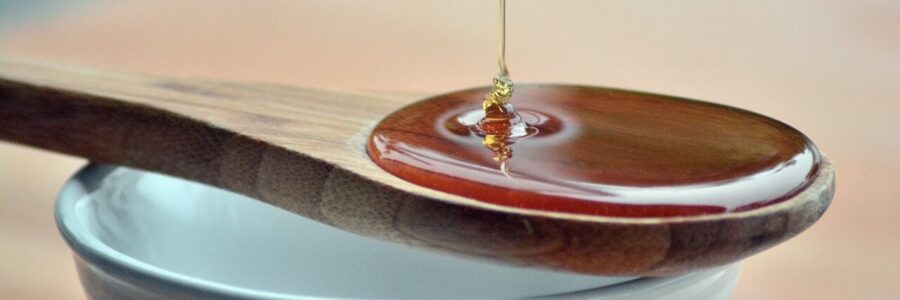Honey has been used as a natural medicine for centuries and is a home remedy for sore throats, allergies, and the common cold. It’s also versatile as a skin soother and skin salve for conditions such as eczema, psoriasis, rosacea, wounds, burns, and itchy skin and dandruff.
The reason it works well as a topical healer is that honey is chock full of antimicrobial, antibacterial, anti-inflammatory, and antioxidant compounds.
Why Manuka Honey?
One specific type, manuka honey, has a higher concentration of antimicrobial properties than other types. Manuka honey is produced in New Zealand and Australia by bees who feed and pollinate from blossoms of a special bush known as manuka, or the broom tea tree.
All honey contains naturally produced hydrogen peroxide caused by glucose oxidation after contact with the bee enzyme glucose oxidase. This is part of the reason why it’s such a great antimicrobial. In manuka honey, there is a second major antibacterial compound called methylglyoxal (MGO), which is found in high concentration in manuka flowers.
Manuka Honey and Itch
In addition to its antibacterial and anti-inflammatory compounds, manuka honey has a low pH and can help restore skin’s natural pH balance. This is another reason it’s so effective in soothing itchy skin. It is also an emollient that helps moisturize skin. This combination of factors is why it can be effective in reducing itch after insect bites, or in cases of hives or dermatitis.
Manuka Honey and Eczema
Small research studies show that manuka honey is an effective topical treatment for eczema lesions – at least as effective as other topical creams — with improved healing and less inflammation.
Another small study used manuka honey in ear drops for those with ear eczema, resulting in decreased symptoms.
In addition to reducing inflammation, reducing itch, and preventing bacteria from proliferating, it hydrates skin by sealing in moisture. All of these factors may make it a good alternative choice to topical steroid-based prescription creams for eczema.
Manuka Honey and Acne
The antibacterial and anti-inflammatory properties of manuka honey make it an excellent topical treatment for acne. You can dab a bit directly on a pimple and leave it, so that it can soothe and reduce the pain and redness while protecting the skin from bacteria. You can also make a mask from manuka honey by blending it with oats or avocado.
How to Use Manuka Honey
First, test a tiny bit of manuka honey on a patch of skin and wait overnight to see if your skin can tolerate it. If it passes the patch test, place a pea size drop of honey on your clean fingertip and massage with a few drops of water so that you can apply it in a thin layer across a wider area of skin. You can leave it on like a mask, or use it as a gentle, healing cleanser and wash it away.
If you are putting manuka honey directly on a skin lesion, be sure to gently clean the area first, apply with clean hands, and cover with gauze or a bandage to protect the area.
Be sure you are buying real Manuka honey produced in New Zealand. Otherwise, you won’t see the same degree of results. The best Manuka honey is marked “medical grade” as it has been tested and is assured to contain active healing compounds.
If you are allergic to pollen or bee stings, go slowly with honey, as it can sometimes cause an allergic reaction. Also, never give honey as a food to children under 1 year old, as for them it may pose a risk of botulism.
Conclusion
Topical manuka honey is a good natural option to reduce itch, inflammation, and bacterial infection when topically applied to skin. For some people, it may be a better option than steroid creams and lotions, which can pose a risk for TSW (topical steroid withdrawal). Unless you are allergic to honey, it has no reported negative side effects, except perhaps being a bit sticky and delicious.
Want to Learn More About Skin Health?
Click HERE to get the Amethyst Holistic Skin Solutions Newsletter. You’ll receive interesting information about skin health via articles, before/after pictures, case studies of Amethyst patients, videos, interviews and more. Feel free to share this article with someone who you think may benefit.
About the Author
Olivia Hsu Friedman, LAc, Dipl.OM, DACM, Cert. TCMDerm, is the owner of Amethyst Holistic Skin Solutions and treats Acne, Eczema, Psoriasis, and TSW. Olivia treats patients via video conferencing using only herbal medicine. Olivia is Chair of the Board of Directors of the American Society of Acupuncturists, serves on the Advisory Board of LearnSkin, and is a faculty member of the Chicago Integrative Eczema Group sponsored by the National Eczema Association.



